Can neutered cats still mate? Many cat owners might be curious about this, especially if they see their male cats acting sexually aggressively after having been neutered.
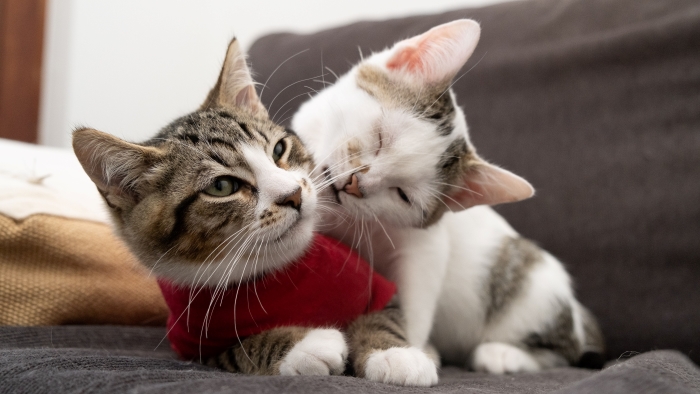
There are numerous distinctive factors that influence a cat’s sexual drive and capacities, so the answer is more complicated than a basic yes or no.
We’ll go over what neutering is, when it should be done, and how it impacts a cat’s mating habits in this post.
What is Neutering?
Surgically removing a male cat’s testicles is known as neutering, commonly referred to as castration or orchiectomy.
Testosterone, a hormone that controls a cat’s reproductive system and sexual activity, is mostly produced in the testicles.
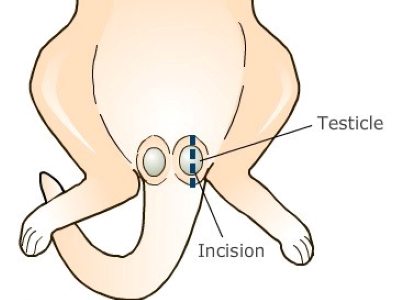
The cat can no longer reproduce and make sperm after having its testicles removed.
Additionally, the process of neutering lowers the level of testosterone produced, which has a variety of impacts on a cat’s well–being and behavior[1].
Can Neutered Cats Still Mate?
The simplest answer is NO; neutered cats cannot naturally reproduce.
The cat is unable to create the hormones required for mating and reproduction when the reproductive organs are removed.
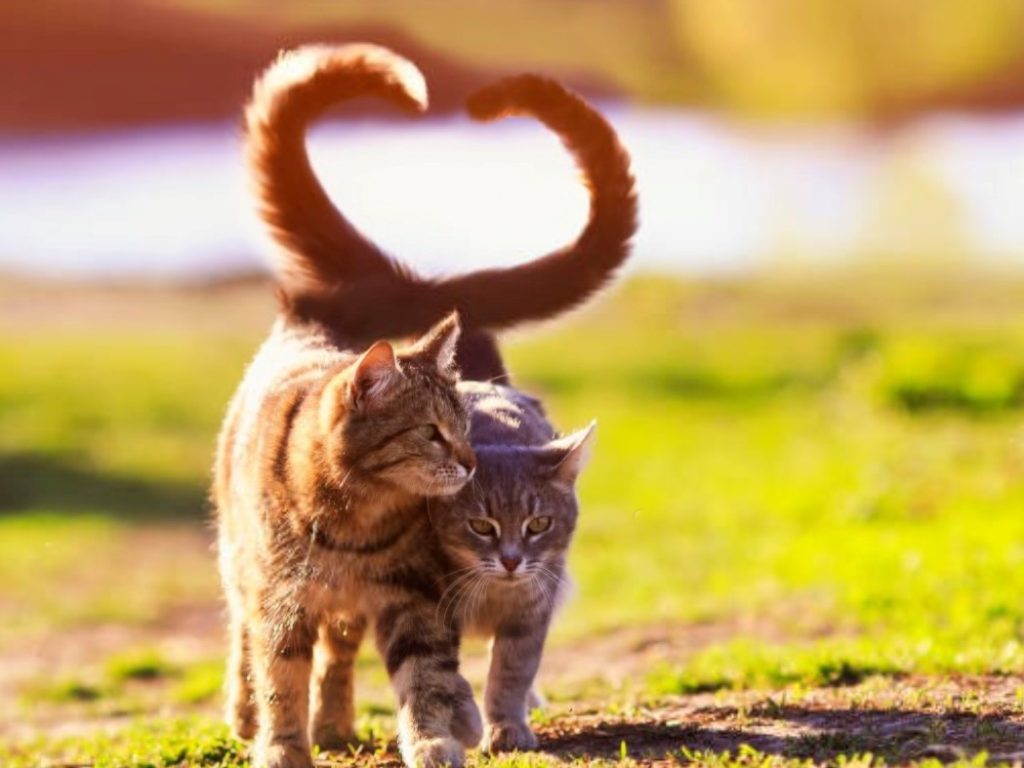
Male cats are no longer able to make sperm, while female cats are no longer able to ovulate or go through heat cycles.
The biological processes necessary for mating and reproduction are therefore inadvertently stopped[2].
Why Should You Neuter Your Cat?
Neutering your cat has a lot of benefits for it personally and for the overall cat population.
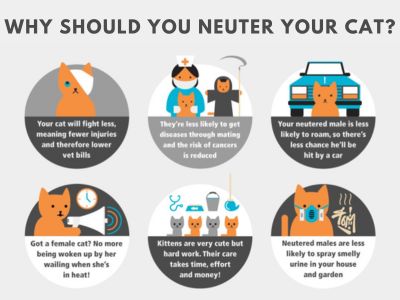
The following are some of the key reasons to neuter your cat:
- Preventing unwanted pregnancies and overpopulation
Millions of stray cats exist worldwide, and a large number of them are put to death or placed in shelters.
Your cat won’t contribute to this issue if you neuter him, and you’ll also help reduce the number of unwanted kittens born.
- Reducing the risk of diseases and injuries
Unneutered male cats are more likely to roam, fight, and contract sexually transmitted diseases, such as feline immunodeficiency virus (FIV) or feline leukemia virus (FeLV).
Neutering your cat can lower his chances of getting into trouble and protect him from these serious infections.
- Improving behavior and temperament
Male cats that haven’t been neutered may be more combative, possessive, and noisy than neutered ones.
To mark their territory, they may sometimes spray urine, which is unpleasant and difficult to clean.
Your cat may become calmer, friendlier, and less inclined to spray if he is neutered.
When Should You Neuter Your Cat?
The best time to neuter your cat depends on several factors, such as his breed, health, lifestyle, and environment.
Generally speaking, it is recommended to neuter your cat when he reaches around 6 months of age.
However, some shelters and rescue organizations perform pediatric neuters at 8 weeks old.
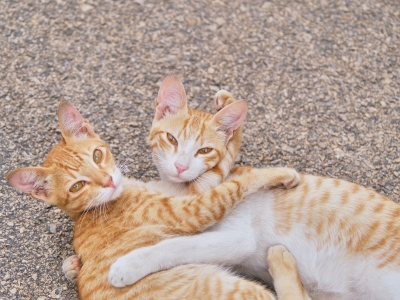
It is important to note that allowing cats to develop with their sex hormones until 6 months old may improve their orthopedic development. So, aiming for that age is often preferred.
If you have a male cat living with an intact female, like a littermate, early neutering may be more advisable in these cases.
There is no upper age limit for neutering, as long as the cat is healthy. However, certain behaviors like spraying can become more ingrained if neutering is done later in life.
If you need clarification on the best timing and risks, consult your veterinarian to discuss the best option for your cat.
The Effect of Neutering on Mating Behavior
In simple terms, Yes, technically, neutered cats can still mate. Will they want to? That is the more pertinent query.
The answer is not straightforward and relies on a number of variables, including the age of neutering, the amount of hormones, and the presence of female cats who are in heat.
The key hormone that fuels the sexual impulse in male cats, testosterone, is stopped from being produced after a cat is neutered.
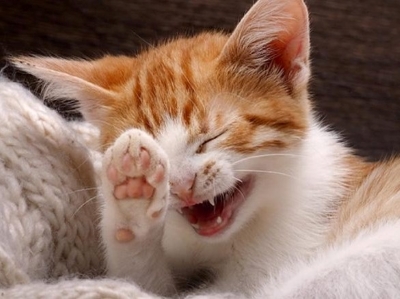
After a cat is neutered, testosterone does not instantly leave the animal’s body. The hormone may not be totally gone for up to 6–7 weeks.
The cat may continue to display certain indications of mating activity throughout this time, such as mounting, rubbing, or vocalizing.
But when the testosterone level falls, these actions will progressively become less frequent.
The age of neutering is another element that affects how neutered cats behave during mating.
Compared to cats that are neutered later in life, cats that are neutered at a young age (about 6 months) are less likely to acquire mating behaviors[3].
Young cats have not reached sexual maturity, and as a result, they have not established strong links between mating and pleasure.
As a result, following neutering, they are less motivated to look for partners.

The presence of female cats in heat can also trigger mating behavior in neutered cats. Female cats in heat release pheromones that attract male cats and signal their readiness to mate.
These pheromones can stimulate the remaining testosterone in neutered cats and cause them to respond with mating attempts.
However, these attempts are usually unsuccessful and frustrating for both parties, as neutered cats cannot ejaculate or impregnate female cats.
The Procedure and Recovery of Neutering
Neutering a cat may be a simple and safe strategy that can be done by a veterinarian at a clinic or a shelter.
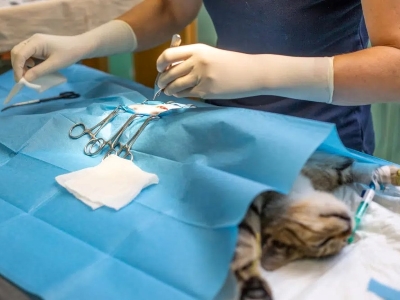
The procedure includes:
- Giving the cat anesthesia to make it unconscious and pain–free.
- Making a small incision in the scrotum and removing the testicles.
- Closing the incision with stitches or glue.
- Monitoring the cat until it wakes up from anesthesia.
After neutering a cat, recovery is typically quick and simple.
The majority of cats may return home from surgery the same day or the day following.
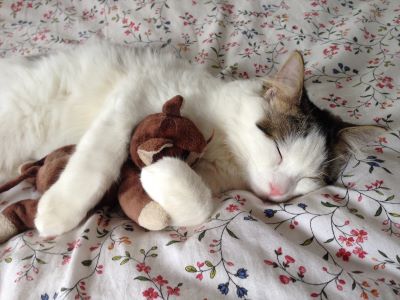
Here are a few tips for caring for a neutered cat:
- Providing a quiet and comfortable place for the cat to rest
- Checking the incision site daily for signs of infection or bleeding
- Preventing the cat from licking or biting the incision site by using a cone collar or a bodysuit
- Limiting the cat’s activity for 7–10 days to avoid straining or injuring the incision site
- Following the veterinarian’s instructions on pain medication, antibiotics, and diet
FAQs
Can neutered cats still have sexual urges?
Yes, neutered cats can exhibit certain sexual behaviors or urges due to their instinctual nature.
However, since their reproductive organs have been surgically removed, these behaviors are not motivated by the opportunity to mate or procreate.
The behaviors are usually more about territory, dominance, or playfulness.
Why do neutered male cats mount other cats?
Mounting behavior in neutered male cats is often a display of dominance, territorial assertion, or playfulness.
It’s important to note that these behaviors are not indicative of the cat’s ability to mate but rather are a part of their natural instincts and social dynamics.
Can neutered female cats still go into heat?
No, neutered female cats do not go into heat after being spayed.
Hormonal changes are what cause heat cycles, and spaying entails removing the ovaries, which halts the generation of the hormones that cause heat cycles and ovulation.
Female cats who are neutered are not in heat or fertile.
Can neutered cats still attract other cats?
Neutered cats might display behaviors that could attract other cats, such as vocalizations or attention-seeking behaviors.
However, these behaviors are not linked to reproductive intent.
Other cats may respond to these behaviors differently depending on their own personalities and experiences.
Will neutering change my cat’s personality or behavior?
Neutering can have a positive impact on a cat’s behavior by reducing certain undesirable traits, such as territorial aggression or excessive roaming.
However, the impact on personality varies among individual cats.
Some may become more affectionate, while others might remain largely unchanged.
Conclusion
Neutering a cat is a responsible and beneficial decision for both the cat and the owner.
It prevents unwanted pregnancies and reduces unwanted behaviors related to mating.
It also improves the health and well-being of the cat by reducing the risk of diseases and injuries.
Neutering a cat does not affect its ability to mate technically, but it does reduce its desire to do so over time.
Therefore, neutered cats are less likely to mate than intact cats, but they may still show some signs of mating behavior under certain circumstances.
By choosing to neuter your cat, you contribute to their overall happiness and a healthier feline community.
Reference:
- Spaying and neutering | Cornell University College of Veterinary Medicine
- Cat reproduction-7 facts you probably don’t know | RSPCA

Dave is our best team member when it comes to taking care of pets on daily basis. This is because he used to be a full-time pet sitter before joining CatLikesBest. Besides contributing his precious knowledge on cat care tips and everyday-use pet products, he still does pet sitting as part of his hobby in his free time.

